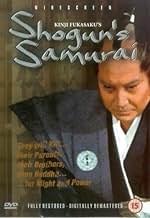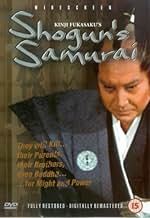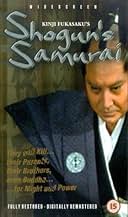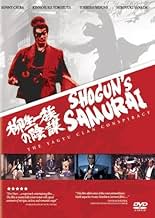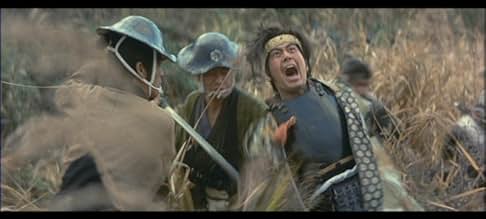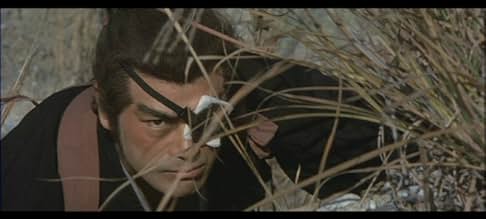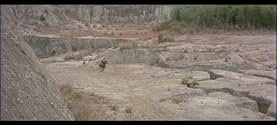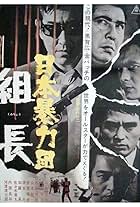IMDb RATING
7.1/10
1.7K
YOUR RATING
After the Tokugawa shogun's death by poisoning, his sons Iemitsu and Tadanaga compete for the shogunate, dividing the land into warring factions. Iemitsu's mentor, betrays all to secure Iemi... Read allAfter the Tokugawa shogun's death by poisoning, his sons Iemitsu and Tadanaga compete for the shogunate, dividing the land into warring factions. Iemitsu's mentor, betrays all to secure Iemitsu's power, leading to widespread conflict.After the Tokugawa shogun's death by poisoning, his sons Iemitsu and Tadanaga compete for the shogunate, dividing the land into warring factions. Iemitsu's mentor, betrays all to secure Iemitsu's power, leading to widespread conflict.
- Director
- Writers
- Stars
- Awards
- 5 nominations total
Kinnosuke Nakamura
- Yagyu Tajima-no-Kami Munenori
- (as Kinnosuke Yorozuya Nakamura)
Shin'ichi Chiba
- Yagyû Jûbê
- (as Sonny Chiba)
Jirô Yabuki
- Yagyu Samon (Yagyu Brother)
- (as Jiro Yabuki)
- Director
- Writers
- All cast & crew
- Production, box office & more at IMDbPro
Featured reviews
I do not know if this movie was made from the first three episodes of the "Yagyuu Conspiracy" TV series or the start of the series made out of the movie, or it was all shot with the idea of the film being a feeder for the series.
In any case, the movie has the same dynamic cast and excellent story cohesion the series featured (my all-time favorite chanbara series). Production values are high, characters interesting (especially the antagonist, imperial noble Kurasumaru, who is an equally dedicated and loyal servant, just of an opposing side), and the plot far more coherent than many Asian offerings. The fight choreography is dynamic yet plausible, but this is not just a string of fight scenes. The setting is a civil war between two sons of a just-dead shogun, and the movie does not slight the importance of politics and maneuvering the powerful nobles into one's camp. On top of this, the third side of the imperial nobles is trying to use the shogun wannabes to weaken the power of the shogunate and restore actual power to the Emperor. This, rather than the Streetfighter movies, made me a Sonny Chiba fan. When can we get this on DVD with English subtitles? (Personally, I hate most dubbing on films. I can read fast enough for subtitles and I prefer hearing the original actor's delivery.)
In any case, the movie has the same dynamic cast and excellent story cohesion the series featured (my all-time favorite chanbara series). Production values are high, characters interesting (especially the antagonist, imperial noble Kurasumaru, who is an equally dedicated and loyal servant, just of an opposing side), and the plot far more coherent than many Asian offerings. The fight choreography is dynamic yet plausible, but this is not just a string of fight scenes. The setting is a civil war between two sons of a just-dead shogun, and the movie does not slight the importance of politics and maneuvering the powerful nobles into one's camp. On top of this, the third side of the imperial nobles is trying to use the shogun wannabes to weaken the power of the shogunate and restore actual power to the Emperor. This, rather than the Streetfighter movies, made me a Sonny Chiba fan. When can we get this on DVD with English subtitles? (Personally, I hate most dubbing on films. I can read fast enough for subtitles and I prefer hearing the original actor's delivery.)
Director Kinji Fukasaku is perhaps best known, in his homeland at least, for his Japanese gangster films, a series with which this movie shares a number of characteristics. Violence and political intrigue are themes throughout both Shogun's Samurai and Battles Without Honor and Humanity, and both feature a lead character who finds his loyalties challenged by betrayals. Both films also feature a large number of characters who seem to have little purpose but to die, and since so little is done to develop them, their deaths have little impact when they do come. This film has other flaws as well. The makeup, costumes and sound design are distractingly poor, and the battle scenes were substandard as well, inferior to other samurai films of earlier years (Seven Samurai comes to mind).
Sonny Chiba plays the Sonny Chiba character in Shogun's Samurai, the no-nonsense master swordsman who strides through the film, scowling menacingly. What a guy; he even gets to wear an eye patch. If you were expecting to see the legendary Toshiro Mifune, you may be disappointed; his appearance amounts to little more than a cameo, and just when it appears that his character might do something interesting, he disappears for good.
Overall, the strengths of the film are its story, which is infinitely more comprehensible than those gangster films, and the challenges posed to traditional concepts of good and evil. Two brothers are challenging for the throne of their recently departed father, who may have had some help on his way out. Early on, it looks as if we will be faced with a couple of characters who couldn't be more clearly good and evil; after all, the older brother stammers and has a birthmark, the sure sign of a villain. Eventually, however, it becomes clear that in a winner-takes-all struggle for power, there are no heroes and villains, only winners and losers.
Sonny Chiba plays the Sonny Chiba character in Shogun's Samurai, the no-nonsense master swordsman who strides through the film, scowling menacingly. What a guy; he even gets to wear an eye patch. If you were expecting to see the legendary Toshiro Mifune, you may be disappointed; his appearance amounts to little more than a cameo, and just when it appears that his character might do something interesting, he disappears for good.
Overall, the strengths of the film are its story, which is infinitely more comprehensible than those gangster films, and the challenges posed to traditional concepts of good and evil. Two brothers are challenging for the throne of their recently departed father, who may have had some help on his way out. Early on, it looks as if we will be faced with a couple of characters who couldn't be more clearly good and evil; after all, the older brother stammers and has a birthmark, the sure sign of a villain. Eventually, however, it becomes clear that in a winner-takes-all struggle for power, there are no heroes and villains, only winners and losers.
There are several reviews here, that stress how the narrative of this chambara film by director Fukasaku Kinji is hard to follow. As someone, who frequently has trouble putting together the plot-lines of 1950's and 1960's jidai-geki films, I did not find this to be the case. Like with so many other samurai films, that were intended for foreign markets as well, this one has a narrator in the beginning, introducing the historical period. I do admit, that the role call happens way too fast, but for the rest of the film, there are a few main characters with clear personalities and agendas, that makes the large narrative comprehensible. Also the pacing is not too fast.
The film's story-line deals with the fight for the shogunate in the 1620's Japan. The second shogun of the Tokugawa line dies under mysterious circumstances without announcing his successor. He has two sons. The older Iemitsu (Matsukata Hiroki) stammers and has a huge birthmark covering half of his face. The younger son Tadanaga (Saigo Teruhiko) does not have these disadvantages, but he also doesn't have a supporter quite as determined as Iemitsu's. That would be the title character Yagyu (Nakamaura Kinnosuke), Iemitsu's fencing instructor, who views the prince as the most important person to him in the whole world, despite having three children of his own. The narrative shows us a fight for power, where innocent blood is shed because of the greed and corruption that takes place amidst the ruling class.
I am not going to spoil it, but people should really stick till the ending, since it powerfully encapsulates the film's message about power corrupting. Before that, the violent images were not clearly used for anti-violence message, since some jidai-geki films merely like to include "cool violence". The presence of Chiba Sonny also makes you anticipate certain things. Chiba's narrative is very important for the final act, but in the early parts, I didn't really like the way it jumped to a different location from the palace drama that we started with.
All in all, this is a very good story, though not historically accurate. There is a big budget, some cameos by famous actors (Tamba Tetsuro, Yamada Isuzu, Mifune Toshiro...), and well-thought-out characters. Especially Nakamura Kinnosuke gives a fantastic performance.
The film's story-line deals with the fight for the shogunate in the 1620's Japan. The second shogun of the Tokugawa line dies under mysterious circumstances without announcing his successor. He has two sons. The older Iemitsu (Matsukata Hiroki) stammers and has a huge birthmark covering half of his face. The younger son Tadanaga (Saigo Teruhiko) does not have these disadvantages, but he also doesn't have a supporter quite as determined as Iemitsu's. That would be the title character Yagyu (Nakamaura Kinnosuke), Iemitsu's fencing instructor, who views the prince as the most important person to him in the whole world, despite having three children of his own. The narrative shows us a fight for power, where innocent blood is shed because of the greed and corruption that takes place amidst the ruling class.
I am not going to spoil it, but people should really stick till the ending, since it powerfully encapsulates the film's message about power corrupting. Before that, the violent images were not clearly used for anti-violence message, since some jidai-geki films merely like to include "cool violence". The presence of Chiba Sonny also makes you anticipate certain things. Chiba's narrative is very important for the final act, but in the early parts, I didn't really like the way it jumped to a different location from the palace drama that we started with.
All in all, this is a very good story, though not historically accurate. There is a big budget, some cameos by famous actors (Tamba Tetsuro, Yamada Isuzu, Mifune Toshiro...), and well-thought-out characters. Especially Nakamura Kinnosuke gives a fantastic performance.
After the second Tokugawa Shogun has died unexpectedly but mysteriously, the is a struggle for succession between two of his sons.
Though the history is bogus, there are plenty of opportunities for Samurai fighting. It is also well written and acted.
Wonderful color, costumes, sets and countryside in widescreen. A grade A production all around.
Though the history is bogus, there are plenty of opportunities for Samurai fighting. It is also well written and acted.
Wonderful color, costumes, sets and countryside in widescreen. A grade A production all around.
I love samurai movies. Really. I love history movies. I love adventure movies. And I found this movie... 'Shogun's Samurai' I though it was going to be great. There are great actors here. Etsushi Takahashi, for example. He was amazing in 'Kill!' and 'Akage'. Hiroyuki Sanada is also great. So is Sonny Chiba. I don't mention Toshiro Mifune because his role here is just a cameo.
Well... The movie was barely watchable. There were lots of problems with it. First, there is the story. It is ridiculously complicated but not compelling enough. Many characters appear but they are not developed at all. Hence I didn't care about their deaths at all. You know, it is quite sad, actually. You see somebody dying violently. You know you are supposed to feel sorry about him. But you don't feel anything because this character is a total stranger to you. I felt sorry for not feeling sorry about the characters.
And here is the second problem with this movie - it is filled with pointless death. Many people die. Men get killed. Women get killed. Kids get killed. Why? Nobody knows. I am not afraid of a little violence but this was just pointless. The story would be absolutely the same without so many killings. And since you don't know the characters at all their deaths have absolutely no emotional impact on you. The character's deaths can only disgust you.
The next problem with this movie is the fights. You know, that's what many people are watching samurai films for - sword fighting and action. But... Some of the fights are really nicely choreographed, there are some incredible moves and so on. But... Most of the fights are actually quite messy due to the bad camera work. The camera is shaking constantly and you can't see anything. It is not like Paul Greengrass directed the movie but still it isn't what one would expect from a samurai movie.
The camera work is a bit strange in my opinion. Sometimes you may see amazing landscapes. There are some very nice shots. Yet when it comes to fighting or some dynamic scene you can barely see anything. Yes, it is a problem. A big problem.
On the other hand there is the acting. It is excellent. Really. A few of the characters are actually well developed and you can care about them. It is mostly because of the actors. They did a really good job with what they are given.
But that's not enough because they are not given much. 5/10. And I really wanted to like the movie.
Well... The movie was barely watchable. There were lots of problems with it. First, there is the story. It is ridiculously complicated but not compelling enough. Many characters appear but they are not developed at all. Hence I didn't care about their deaths at all. You know, it is quite sad, actually. You see somebody dying violently. You know you are supposed to feel sorry about him. But you don't feel anything because this character is a total stranger to you. I felt sorry for not feeling sorry about the characters.
And here is the second problem with this movie - it is filled with pointless death. Many people die. Men get killed. Women get killed. Kids get killed. Why? Nobody knows. I am not afraid of a little violence but this was just pointless. The story would be absolutely the same without so many killings. And since you don't know the characters at all their deaths have absolutely no emotional impact on you. The character's deaths can only disgust you.
The next problem with this movie is the fights. You know, that's what many people are watching samurai films for - sword fighting and action. But... Some of the fights are really nicely choreographed, there are some incredible moves and so on. But... Most of the fights are actually quite messy due to the bad camera work. The camera is shaking constantly and you can't see anything. It is not like Paul Greengrass directed the movie but still it isn't what one would expect from a samurai movie.
The camera work is a bit strange in my opinion. Sometimes you may see amazing landscapes. There are some very nice shots. Yet when it comes to fighting or some dynamic scene you can barely see anything. Yes, it is a problem. A big problem.
On the other hand there is the acting. It is excellent. Really. A few of the characters are actually well developed and you can care about them. It is mostly because of the actors. They did a really good job with what they are given.
But that's not enough because they are not given much. 5/10. And I really wanted to like the movie.
Storyline
Did you know
- TriviaOne of the characters in the film carries a cane which is in fact a disguised sword. This type of katana was known as shikomizue, and both it's handle and it's sheath comprised the cane.
- ConnectionsFollowed by Yagyû ichizoku no inbô (1978)
- How long is Yagyu Clan Conspiracy?Powered by Alexa
Details
- Release date
- Country of origin
- Language
- Also known as
- The Shogun's Samurai
- Production company
- See more company credits at IMDbPro
Contribute to this page
Suggest an edit or add missing content


